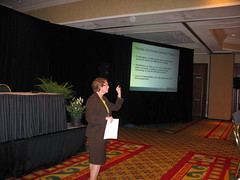 Gail Ostler of the US Treasury says the financial crisis has created a significant awareness of the cash management. She believes that many PFM experts have a narrow view of cash management. Cash management is much more than cash flow forecasting or Treasury Single Accounts. Ms. Ostler defines cash management as "having the right money in the right place at the right time to meet government objectives."
Gail Ostler of the US Treasury says the financial crisis has created a significant awareness of the cash management. She believes that many PFM experts have a narrow view of cash management. Cash management is much more than cash flow forecasting or Treasury Single Accounts. Ms. Ostler defines cash management as "having the right money in the right place at the right time to meet government objectives."Cash Management Objectives
Ms. Oslter said that the objectives of cash management include cash mobilization, controlled disbursements, investing money and reduce borrowing. Other objectives include:
- Safeguard cash and investment
- Minimize the volume of idle balances
- Match the timing of cash inflows and cash outflows
- Reduce operational risk
- Pay vendors on time because late payments increases the cost of goods and services.
- Reduce the cost of borrowing
- Minimize transactions costs
- Increase investment income
Ms. Ostler pointed out that cash management is not a substitute for poor budgeting decision. It is not a substitute for spending in excess of budget authority or any form of budget and accounting controls. Many governments have incorrectly managed budgets through cash management according to Ms. Ostler. Many governments use Ministry bank accounts to attempt to control budgets. The result is that the government loses cash control. Ms. Ostler advocates that cash management must be delinked from budget controls.
Results of a Poorly Defined Program
Ms. Ostler articulated the problems associated with poorly defined programs, particularly those resulting from the proliferation of both private and central bank accounts. Other poor results include:
- Restrictions of the use of cash often results in unnecessary borrowing or lost investment income
- Impossible to reconcile all accounts
- Treasury isolated from cash information
- Thwart central bank monetary policy
- Cash rationing that prevents proper budget execution
- Overly expensive bank changes
Ms. Ostler defined the components of a strong program including:
- Written policies and procedures
- Strong cash management organization
- Bank relationships
- Reduction of bank accounts
- Collections made through the banking system
- Deposit accounts swept daily to central government accounts
- Treasury performs centralized payments
- As many payments as possible should be electronic
- Cash disbursements eliminated or minimized
- Ministries and agencies penalized for making commitments outside of their budget authority
- Full cash flow forecasting, on a 12 month roll-forward basis
- Follow-up on variances between cash flow forecasts and actual payments
Many cash managers analyze information in their offices according to Ms. Ostler. She advocates being proactive and understanding where there are cash is coming from. Ms. Ostler advocates that governments should look at the banking relationships in other countries.
Ms. Ostler responded to a question about deficits. She says that managing cash when there is not cash means looking at systemic issues. Governments need to reduce expenditure budgets when there are revenue shortfalls.
Procurement linkage with commitments is needed for effective cash management according to Ms. Ostler. Many long-term projects have multiple year commitments. She advocates linking with government commitment accounting systems.
Ms. Ostler said that there are ways to allow ministries to manage projects that are tied to revenues the ministry has collected without giving them cash control and separate bank accounts.





No comments:
Post a Comment